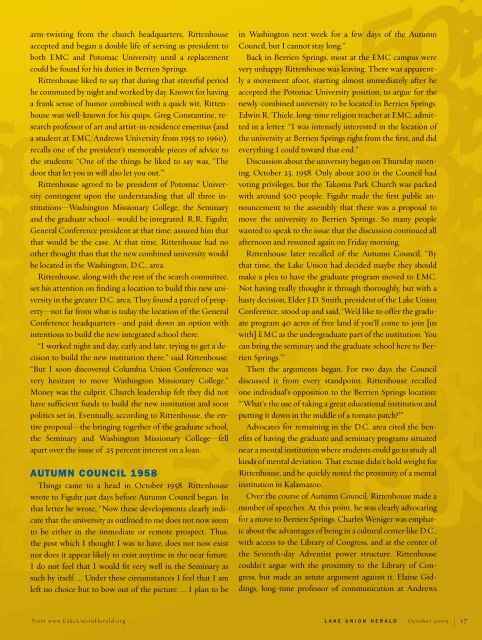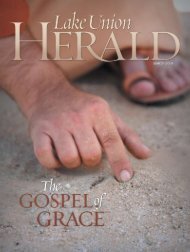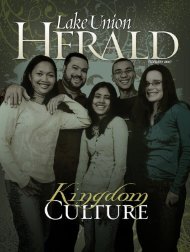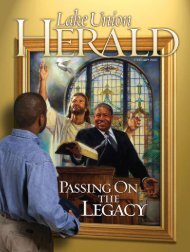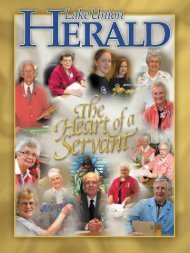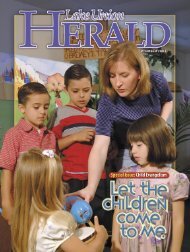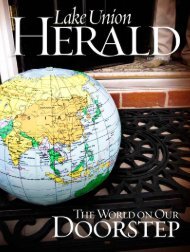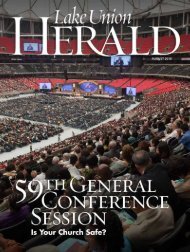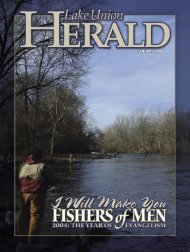YOUTHin Action - Lake Union Conference - General Conference of ...
YOUTHin Action - Lake Union Conference - General Conference of ...
YOUTHin Action - Lake Union Conference - General Conference of ...
You also want an ePaper? Increase the reach of your titles
YUMPU automatically turns print PDFs into web optimized ePapers that Google loves.
arm-twisting from the church headquarters, Rittenhouse<br />
accepted and began a double life <strong>of</strong> serving as president to<br />
both EMC and Potomac University until a replacement<br />
could be found for his duties in Berrien Springs.<br />
Rittenhouse liked to say that during that stressful period<br />
he commuted by night and worked by day. Known for having<br />
a frank sense <strong>of</strong> humor combined with a quick wit, Rittenhouse<br />
was well-known for his quips. Greg Constantine, research<br />
pr<strong>of</strong>essor <strong>of</strong> art and artist-in-residence emeritus (and<br />
a student at EMC/Andrews University from 1955 to 1960),<br />
recalls one <strong>of</strong> the president’s memorable pieces <strong>of</strong> advice to<br />
the students: “One <strong>of</strong> the things he liked to say was, ‘The<br />
door that let you in will also let you out.’”<br />
Rittenhouse agreed to be president <strong>of</strong> Potomac University<br />
contingent upon the understanding that all three institutions—Washington<br />
Missionary College, the Seminary<br />
and the graduate school—would be integrated. R.R. Figuhr,<br />
<strong>General</strong> <strong>Conference</strong> president at that time, assured him that<br />
that would be the case. At that time, Rittenhouse had no<br />
other thought than that the new combined university would<br />
be located in the Washington, D.C., area.<br />
Rittenhouse, along with the rest <strong>of</strong> the search committee,<br />
set his attention on finding a location to build this new university<br />
in the greater D.C. area. They found a parcel <strong>of</strong> property—not<br />
far from what is today the location <strong>of</strong> the <strong>General</strong><br />
<strong>Conference</strong> headquarters—and paid down an option with<br />
intentions to build the new integrated school there.<br />
“I worked night and day, early and late, trying to get a decision<br />
to build the new institution there,” said Rittenhouse.<br />
“But I soon discovered Columbia <strong>Union</strong> <strong>Conference</strong> was<br />
very hesitant to move Washington Missionary College.”<br />
Money was the culprit. Church leadership felt they did not<br />
have sufficient funds to build the new institution and soon<br />
politics set in. Eventually, according to Rittenhouse, the entire<br />
proposal—the bringing together <strong>of</strong> the graduate school,<br />
the Seminary and Washington Missionary College—fell<br />
apart over the issue <strong>of</strong> .25 percent interest on a loan.<br />
Autumn Council 1958<br />
Things came to a head in October 1958. Rittenhouse<br />
wrote to Figuhr just days before Autumn Council began. In<br />
that letter he wrote, “Now these developments clearly indicate<br />
that the university as outlined to me does not now seem<br />
to be either in the immediate or remote prospect. Thus,<br />
the post which I thought I was to have, does not now exist<br />
nor does it appear likely to exist anytime in the near future.<br />
I do not feel that I would fit very well in the Seminary as<br />
such by itself. ... Under these circumstances I feel that I am<br />
left no choice but to bow out <strong>of</strong> the picture. ... I plan to be<br />
in Washington next week for a few days <strong>of</strong> the Autumn<br />
Council, but I cannot stay long.”<br />
Back in Berrien Springs, most at the EMC campus were<br />
very unhappy Rittenhouse was leaving. There was apparently<br />
a movement afoot, starting almost immediately after he<br />
accepted the Potomac University position, to argue for the<br />
newly-combined university to be located in Berrien Springs.<br />
Edwin R. Thiele, long-time religion teacher at EMC, admitted<br />
in a letter: “I was intensely interested in the location <strong>of</strong><br />
the university at Berrien Springs right from the first, and did<br />
everything I could toward that end.”<br />
Discussion about the university began on Thursday morning,<br />
October 23, 1958. Only about 200 in the Council had<br />
voting privileges, but the Takoma Park Church was packed<br />
with around 500 people. Figuhr made the first public announcement<br />
to the assembly that there was a proposal to<br />
move the university to Berrien Springs. So many people<br />
wanted to speak to the issue that the discussion continued all<br />
afternoon and resumed again on Friday morning.<br />
Rittenhouse later recalled <strong>of</strong> the Autumn Council, “By<br />
that time, the <strong>Lake</strong> <strong>Union</strong> had decided maybe they should<br />
make a plea to have the graduate program moved to EMC.<br />
Not having really thought it through thoroughly, but with a<br />
hasty decision, Elder J.D. Smith, president <strong>of</strong> the <strong>Lake</strong> <strong>Union</strong><br />
<strong>Conference</strong>, stood up and said, ‘We’d like to <strong>of</strong>fer the graduate<br />
program 40 acres <strong>of</strong> free land if you’ll come to join [us<br />
with] EMC as the undergraduate part <strong>of</strong> the institution. You<br />
can bring the seminary and the graduate school here to Berrien<br />
Springs.’”<br />
Then the arguments began. For two days the Council<br />
discussed it from every standpoint. Rittenhouse recalled<br />
one individual’s opposition to the Berrien Springs location:<br />
“‘What’s the use <strong>of</strong> taking a great educational institution and<br />
putting it down in the middle <strong>of</strong> a tomato patch’”<br />
Advocates for remaining in the D.C. area cited the benefits<br />
<strong>of</strong> having the graduate and seminary programs situated<br />
near a mental institution where students could go to study all<br />
kinds <strong>of</strong> mental deviation. That excuse didn’t hold weight for<br />
Rittenhouse, and he quickly noted the proximity <strong>of</strong> a mental<br />
institution in Kalamazoo.<br />
Over the course <strong>of</strong> Autumn Council, Rittenhouse made a<br />
number <strong>of</strong> speeches. At this point, he was clearly advocating<br />
for a move to Berrien Springs. Charles Weniger was emphatic<br />
about the advantages <strong>of</strong> being in a cultural center like D.C.,<br />
with access to the Library <strong>of</strong> Congress, and at the center <strong>of</strong><br />
the Seventh-day Adventist power structure. Rittenhouse<br />
couldn’t argue with the proximity to the Library <strong>of</strong> Congress,<br />
but made an astute argument against it. Elaine Giddings,<br />
long-time pr<strong>of</strong>essor <strong>of</strong> communication at Andrews<br />
Vi s i t w w w. L a k e Un i o n He r a l d . o r g L a k e U n i o n H e r a l d • Oc t o b e r 2 0 0 9 | 17


